| Srl | Item |
| 1 |
ID:
086440
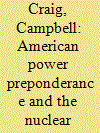

|
|
|
|
|
| Publication |
2009.
|
| Summary/Abstract |
The theory of Power Preponderance put forward by Stephen Brooks and William Wohlforth is poised to replace structural balance-of-power theory as the leading American Realist interpretation of international politics. Power Preponderance argues that would-be rivals to the US are not balancing against it because they are dissuaded from doing so by geopolitical and structural factors, rather than because they love the US or are cowed by it. This article shows why the central analytical claim of Power Preponderance would be substantially enhanced by incorporating the logic of the nuclear revolution, but that its main policy recommendation - indefinite and magnanimous American preponderance - is undermined by the spectre of nuclear war. In the nuclear age, normative solutions to the problem of anarchy invariably gravitate toward the logic of a world state.
|
|
|
|
|
|
|
|
|
|
|
|
|
|
|
|
| 2 |
ID:
064660
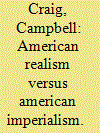

|
|
|
| 3 |
ID:
124382
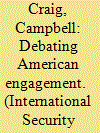

|
|
|
|
|
| Publication |
2013.
|
| Summary/Abstract |
In making their case for maintaining the United States' policy of "deep engagement," Stephen Brooks, John Ikenberry, and William Wohlforth stress that the U.S. security commitment to states in Europe, the Middle East, and East Asia, together with the formidable specter of American preponderance, stifles regional rivalries and hinders the resurgence of a dangerous era of multipolar power politics. The authors contend that a policy of U.S. retrenchment could spark the "return of insecurity and conflict among Eurasian powers," whereas a continuing policy of deep engagement, by "supplying reassurance, deterrence, and active management … lowers security competition in the world's key regions, thereby preventing the emergence of a hothouse atmosphere for growing new military capabilities." In short, they suggest, deep engagement reduces the chances of a major Eurasian war; a new strategy of retrenchment would increase them.
|
|
|
|
|
|
|
|
|
|
|
|
|
|
|
|
| 4 |
ID:
113620
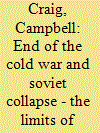

|
|
|
|
|
| Publication |
2012.
|
| Summary/Abstract |
William Wohlforth and Daniel Deudney and John Ikenberry provide strong Realist and Liberal analyses, respectively, of the End of the Cold War. Both interpretations, however, beg larger conceptual and historical questions, which cannot be answered without making the nuclear revolution central to explaining Soviet collapse.
|
|
|
|
|
|
|
|
|
|
|
|
|
|
|
|
| 5 |
ID:
124745
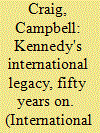

|
|
|
|
|
| Publication |
2013.
|
| Summary/Abstract |
This article explores historical assessments of the foreign policy of President John F. Kennedy, who was assassinated fifty years ago. It traces the evolution of JFK historiography from the uncritical so-called 'Camelot' school to harsh revisionist critiques in the 1980s and 1990s, and on to the current 'third wave' of scholarship. The article focuses in particular on new work concerning JFK's handling of the Berlin and Cuba superpower crises, his role in expanding the United States' involvement in Vietnam (and whether blame for this war can be assigned to him) and larger questions about his approach to the danger of nuclear holocaust and the possibility of defusing Cold War tensions. The conclusion to the article examines his various peace-seeking initiatives in the months following the Cuban Missile Crisis, and suggests that Kennedy may have been turning towards a more critical view of American Cold War politics when he was killed in Dallas in November 1963
|
|
|
|
|
|
|
|
|
|
|
|
|
|
|
|
| 6 |
ID:
158009
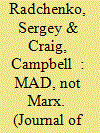

|
|
|
|
|
| Summary/Abstract |
The revival of nuclear strategy in US policy and scholarship has been strengthened by arguments that the ‘nuclear revolution’ – the assumption that thermonuclear bombs and missiles had made major war too dangerous to wage – does not affect international behaviour as much as nuclear revolution advocates claim. This article shows that the Soviet leader Nikita Khrushchev indeed regarded nuclear war as too dangerous to wage, a decision which manifested itself not so much in foreign policy or military doctrine but in his determination to avoid war when the possibility arose. We argue that Khrushchev’s experience provides us with a more useful way to characterise the nuclear revolution and suggest some implications of this argument for contemporary debates about nuclear weaponry.
|
|
|
|
|
|
|
|
|
|
|
|
|
|
|
|
| 7 |
ID:
115000
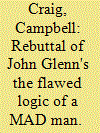

|
|
|
| 8 |
ID:
117428
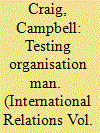

|
|
|
|
|
| Publication |
2012.
|
| Summary/Abstract |
Scott Sagan's analysis of the Cuban missile crisis in The Limits of Safety shows how accidents almost triggered a nuclear exchange during that conflict and how they are likely to cause an actual nuclear war at some point in the future. This article examines how Sagan's crucially important study affects our understanding of the salience of deterrence and non-proliferation in the post-Cold War order and the prospects of nuclear peace. The conclusion contends that Sagan's advocacy of nuclear arsenal modernisation and active non-proliferation efforts aimed at aspiring nuclear powers may well increase, rather than diminish, the chances of major nuclear war.
|
|
|
|
|
|
|
|
|
|
|
|
|
|
|
|
| 9 |
ID:
153505
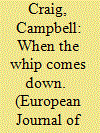

|
|
|
|
|
| Summary/Abstract |
This article examines the conflict between traditional Marxist attitudes toward war and the problem of the nuclear revolution. It shows how the advent of the nuclear revolution in the 1950s undermined traditional Marxist-Leninist concepts of war, and then goes on to argue that this development must be placed at the centre of contemporary Marxian IR if it is to have explanatory power in the twenty-first century. To make this case directly, it engages with Justin Rosenberg’s revival of Trotsky’s idea of uneven and combined development and its subsidiary law of ‘the whip of external necessity’, and argues that the whip can remain salient today only if one accepts the political utility of nuclear war. The impasse created by the nuclear revolution, it concludes, points Marxist IR in the direction of classic Marxist visions of supranationalism and human unity.
|
|
|
|
|
|
|
|
|
|
|
|
|
|
|
|